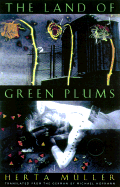

Spare, wildly poetic, luridly surreal, frequently unfathomable, The Land of Green Plums by Herta Müller, the 2009 Nobel Prize winner, is like nothing else out there.
The titular "land of green plums" is Romania during the terror reign of Ceausescu's Securitate from which the author escaped to Germany in 1987. The unnamed narrator assures you, "You can't eat green plums, their pits are still soft, and you'll swallow your death." Slowly a narrative emerges from the opening chaos of surreal memories. Lola, the girl from the provinces who embraces urban communism whole-heartedly, ends up hanging herself in the closet with the narrator's belt.
This propels the narrator into a group of three students, all boys, who are politically resistant. Together they begin communicating by secret code words, endure scare tactics by menacing communist goons and survive searches and arrests as they elude the sinister Captain Pjele, the interrogator on their trail.
Edgar, Kurt and Georg are only slightly individualized. Characterization is not the point here. Müller is primarily a poet. This is evident not only in her images, but in the way the book moves forward--there are no chapters, only short sections separated by spaces and asterisks, each with the independence and impact of a separate poem, often ending provocatively and demanding a pause afterward to digest it.
The novel abounds in startling images--like Russian soldiers taking turns sticking their heads in the toilet and having someone flush it to wash their hair. Blood-drinking in Romania, famous in vampire lore, here in a Romanian slaughterhouse takes on a whole new meaning.
"How do you have to live.... to be in harmony with what you honestly think?" muses the narrator, and it's the theme of the novel. Followed in the streets, fired from their jobs, tempted daily by suicide, threatened by interrogation, betrayed by friends, the characters struggle through the thousand compromises of survival in a world where everyone is a possible informant.
In the course of this short novel, half of the characters die, all but one of them by suicide, choosing to execute themselves rather than endure the paranoia and repression of the dictatorship. Where is this sad, beautifully written, cumulatively moving novel heading? Right back to where it started, beginning and ending with the same sentence, but how differently the same words sound at the end.--Nick DiMartino
Shelf Talker: Poetic and surreal, this novel by the latest Nobel Prize winner is startling and moving.

